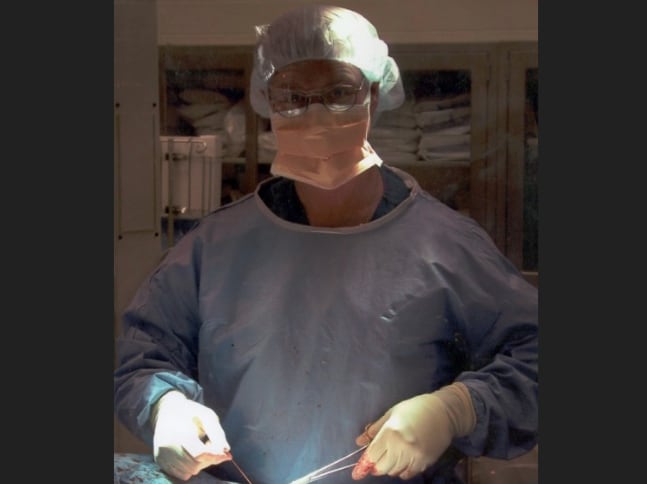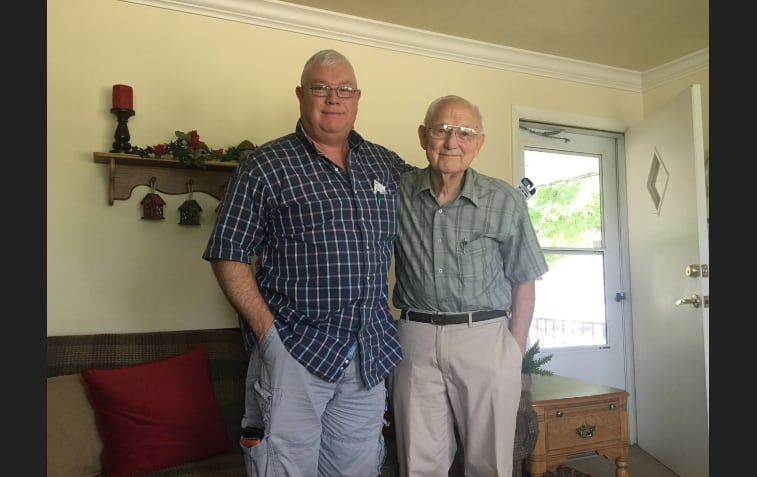One month ago, Capt. Douglass Hickok and his daughter negotiated the old stone fortifications along Sandy Hook, New Jersey, a thin stretch of sand and rock jutting into the bay south of Brooklyn.
“My dad was really excited. He liked to go on trips and be spontaneous,” Shandrea Hickok, 26, said over the telephone Tuesday. “We had such a great time exploring it and looking at the old military fort and reading all the signs. That was my last memorable experience with my dad.”
Hickok, a 57-year-old physician assistant in the New Jersey National Guard, was hospitalized March 21 after testing positive for the novel coronavirus. A week later, he succumbed to the respiratory disease at a Pennsylvania hospital — the first coronavirus-related death of a service member during a pandemic that has taken the lives of nearly 3,000 people in the United States.
As a Guardsman and medical professional, Hickok hadn’t yet been activated to assist his state in tamping down the pandemic. He had, his daughter noted, recently traveled to a conference in New Jersey on March 16, the Monday before he was hospitalized.
But Hickok traveled a lot. The soldier, who was trained as a surgical physician assistant at Cornell University, worked at a medical clinic in Connecticut and resided in Pennsylvania. After leaving New Jersey, Hickok went back to work at the clinic for the rest of the week. Where and how he contracted the virus is almost impossible to know, his daughter said.
Hickok had last reported to drill in February and was planning to reschedule his March drill when he fell ill, said Kryn Westhoven, a spokesman for the New Jersey Department of Military and Veterans Affairs.
Days before he was hospitalized, Hickok experienced a mild fever on a Thursday night, his daughter said. Hickok took Tylenol and woke the next morning feeling fine. The doctor he worked under cleared Hickok to come in and work in the clinic. At about 1 a.m. the next morning, Shandrea received a call from her father.
“He was having trouble breathing," she said. "He was kind of huffing and puffing and he was going to the emergency room.”

Not long after being admitted to Lehigh Valley Hospital-Pocono, a chest x-ray showed Hickok was experiencing a viral pneumonia consistent with COVID-19, the respiratory disease caused by the coronavirus. There wasn’t any doubt in his mind what he had.
“My father is kind of humorous, so my dad was like ‘if it clucks like a chicken, then it is a chicken,’” Shandrea said. Due to the contagiousness of the virus, she and her brother spoke to their father over the telephone.
Hickok’s sister also spoke with him over the telephone prior to him being put on a ventilator. They talked about their childhood together, recalling one Halloween in high school when Hickok asked his sister to help him dress up like the Hulk.
“I had green paint on my fingernails for weeks after that," Mary Hickok Scott said.
Hickok, who faced bullying in his youth, emulated Lou Ferrigno, the actor and body builder famous for portraying David Banner and the Hulk on the 1970 television show of the same name. Ferrigno has often talked about his own challenges in standing up to bullies as a child.
"So he dressed up like the Hulk to show that he could stand up to bullies too,” Scott said. “He made the yearbook that year. I don’t know why the memory popped into his head, but it did.”

Hickok’s father left the Air Force as a major, according to family members. And his son, Noah, is determined to commission into the Navy after he finishes up at Rutgers University, Shandrea said.
Hickok joined the service a bit later in life. He commissioned in the Army National Guard in 2010, already bringing with him 28 years of experience in orthopedic care, acute care, employee health and trauma surgery, according to New Jersey Guard spokeswoman Lt. Col. Barbara Brown.
Hickok loved serving in the Army, his daughter said. At a barbecue, Shandrea recalled meeting two soldiers her father treated after they were in a vehicle accident on their way to training. Their truck went over a guardrail and into a steep ditch. Hickok followed them off the road.
“He got the soldiers out of the truck and they were both alive,” Shandrea said. “He stayed with them [at the hospital] until their families got there to make sure they were okay. ... I think that’s an important aspect of my dad. He was just really devoted."
Kyle Rempfer was an editor and reporter who has covered combat operations, criminal cases, foreign military assistance and training accidents. Before entering journalism, Kyle served in U.S. Air Force Special Tactics and deployed in 2014 to Paktika Province, Afghanistan, and Baghdad, Iraq.




